According to a Bundestag resolution, the “Future Center for German Unity and European Transformation” is to be built in East Germany by 2028. At the beginning of next year, a decision will be made as to where the large research and educational facility will be built. Frankfurt/Oder, Halle/Saale, Eisenach, Jena, Mühlhausen and Sonneberg as well as Leipzig and Plauen have applied.
WORLD: Mr. Kowalczuk, at a hearing in the Bundestag you spoke out in favor of the planned future center for German unity and European transformation. Why is this needed?
Ilko-Sascha Kowalczuk: A first reason is that people continue to think in terms of “East Germany” and “West Germany”. More than 30 years since unity, it's time to move on. The Center can help with that. But I'll say right away that I don't believe in building a branch in the West next to the headquarters, which should be in East Germany for reasons of structural support.
WORLD: Why?
Kowalczuk: Because then there would still be the “East” and “West” blocks. And what good would a branch in Stuttgart do for the people of Hamburg? Instead, the planned center with 180 to 200 jobs must have a single location for permanent exchange, but at the same time act as a starting point to swarm out to all regions with events, exhibitions and interventions. It must not be an authority that revolves around itself. This could prevent a strong participation of international personalities, who would be just as indifferent to German official logic as German parties' attempts to influence.
WORLD: Why are Eastern European scientists so important to you?
Kowalczuk: It is important to dismantle the deep misunderstandings, ignorance and lack of empathy towards Eastern Europe and the post-communist region that prevail in Western Europe. This particularly affects Germany in West and East.
This can be seen in the widespread anti-Americanism and enthusiasm for communist ideas, in the downplaying of Putin and arrogance towards Ukraine, which was invaded by Russia. In addition, the ignoring of Eastern Europe is a heavy burden for the political culture of East Germany.
WORLD: Why?
Kowalczuk: For decades, the promise of the Kohl government to equalize living conditions determined the standards of comparison in East Germany. The majority of East Germans did not measure their living conditions by the starting conditions of 1989 or by the similar conditions in post-communist countries such as Poland or the Baltic States, but by West Germany. On the one hand, that explains a lot about the complaining culture.
On the other hand, the non-observance of the Eastern European states meant that their experiences and conflicts with communism and Russian imperialism were not carried out in Germany. The center can counteract this.
WORLD: Name a specific benefit.
Kowalczuk: Think about the training of teachers: there is not a single chair for the history of communism in Germany, and the history of the GDR is scandalously neglected at the universities. Consequently, the prospective teachers cannot deal with the history of communism in the way that is rightly self-evident with the history of the Nazis. And that's why they can't talk profoundly about communism and the GDR in schools.
WORLD: Could a comparative look at the development in Poland or in the Baltic States since 1989 also have something comforting? Would East Germans recognize that they were not left behind, but that they managed a lot very well under the general difficulties of post-communism?
Kowalczuk: I wouldn't speak of anything comforting, I don't like the word. 1989 brought freedom, which is no consolation, but the basic requirement for everything. But one thing is clear: in the entire post-communist region in 1989, the political and economic system was a wasteland of rubble with tiny oases. In East Germany, the upheaval in the course of unification was most radical and the shock of transformation was greatest, but the social cushioning of the upheaval was also greatest.
And so the question arises as to what can give more self-confidence: The view of the West, where everything seems to shine and which you can only ever pant after? Or the view into my own shithole, from which I was able to climb, as well as the view of the eastern neighbors, who had similar starting conditions and with whom I can exchange ideas? It's about self-approval, comparing yourself to yourself and to people in similar situations.
WORLD: For older people, this would also include rethinking their own role in the GDR instead of blaming Honecker and the Stasi.
Kowalczuk: It was the West that prevented such thinking. All the demands for the "close line" came from the West, and conversely the SED-PDS-Left Party continuity was criticized by no one as sharply as by Easterners. In this respect, greater self-recognition by East Germans would also contribute to emancipation from their permanent relationship with the West.
Of course, it must also be discussed that it was not “the” East Germans who made the 1989 revolution. Revolutions make minorities. In the GDR, too, most people stood behind the curtains, waited to see what would happen and then sided with the winners. It's not bad, but it should be discussed. Because only then can the biographies of many East Germans, who made the GDR system possible as followers, tell.
After 1989, we determined GDR critics made the mistake of speaking primarily about the resistance in order to appropriate history and appreciate the victims. But many East Germans reacted defensively because it didn't fit their own biographies. Their biographies must be able to be told without embellishment. It is also about dealing with freedom: those who are given freedom without lifting a finger do not always deal with it carefully.
WORLD: Do you think that older citizens of the former GDR are still receptive to new impulses?
Kowalczuk: There will probably not be much change among older people in East and West, who now have entrenched extremist positions. The focus will have to be on giving the younger ones the necessary knowledge and thus enabling empathy.
Only when I know how people, through individual experiences and decisions, came to risk conflict with the dictatorship can I empathize with them and bring myself into an appropriate relationship with them. Knowing how terribly the people of Ukraine suffered in Soviet times and during the Nazi war of aggression, I can be interested in their situation today under the Russian war of aggression.
Such knowledge is only possible if we break the vicious circle of family supper talks in which the children are exposed to the reproductions of dictatorship-related socializations and then reproduce them themselves. That too was a mistake after 1989: people thought that democracy was self-explanatory, that everyone knew how it worked and that it would prevail on its own. But democracy also needs free democratic education.
"Kick-off Politics" is WELT's daily news podcast. The most important topic analyzed by WELT editors and the dates of the day. Subscribe to the podcast on Spotify, Apple Podcasts, Amazon Music or directly via RSS feed.

 His body naturally produces alcohol, he is acquitted after a drunk driving conviction
His body naturally produces alcohol, he is acquitted after a drunk driving conviction Who is David Pecker, the first key witness in Donald Trump's trial?
Who is David Pecker, the first key witness in Donald Trump's trial? What does the law on the expulsion of migrants to Rwanda adopted by the British Parliament contain?
What does the law on the expulsion of migrants to Rwanda adopted by the British Parliament contain? The shadow of Chinese espionage hangs over Westminster
The shadow of Chinese espionage hangs over Westminster Parvovirus alert, the “fifth disease” of children which has already caused the death of five babies in 2024
Parvovirus alert, the “fifth disease” of children which has already caused the death of five babies in 2024 Colorectal cancer: what to watch out for in those under 50
Colorectal cancer: what to watch out for in those under 50 H5N1 virus: traces detected in pasteurized milk in the United States
H5N1 virus: traces detected in pasteurized milk in the United States What High Blood Pressure Does to Your Body (And Why It Should Be Treated)
What High Blood Pressure Does to Your Body (And Why It Should Be Treated) “I’m interested in knowing where the money that the State takes from me goes”: Bruno Le Maire’s strange pay slip sparks controversy
“I’m interested in knowing where the money that the State takes from me goes”: Bruno Le Maire’s strange pay slip sparks controversy Despite the lifting of the controllers' strike, massive flight cancellations planned for Thursday, April 25
Despite the lifting of the controllers' strike, massive flight cancellations planned for Thursday, April 25 The right deplores a “dismal agreement” on the end of careers at the SNCF
The right deplores a “dismal agreement” on the end of careers at the SNCF The United States pushes TikTok towards the exit
The United States pushes TikTok towards the exit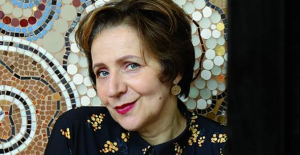 Saturday is independent bookstore celebration
Saturday is independent bookstore celebration In Paris as in Marseille, the Flames ceremony opens to fans of rap and hip-hop
In Paris as in Marseille, the Flames ceremony opens to fans of rap and hip-hop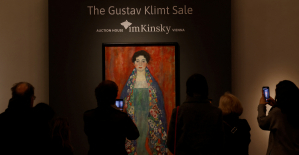 Sale of the century for a mysterious painting by Klimt, in Austria
Sale of the century for a mysterious painting by Klimt, in Austria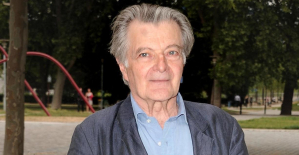 Philippe Laudenbach, actor with more than a hundred supporting roles, died at 88
Philippe Laudenbach, actor with more than a hundred supporting roles, died at 88 Skoda Kodiaq 2024: a 'beast' plug-in hybrid SUV
Skoda Kodiaq 2024: a 'beast' plug-in hybrid SUV Tesla launches a new Model Y with 600 km of autonomy at a "more accessible price"
Tesla launches a new Model Y with 600 km of autonomy at a "more accessible price" The 10 best-selling cars in March 2024 in Spain: sales fall due to Easter
The 10 best-selling cars in March 2024 in Spain: sales fall due to Easter A private jet company buys more than 100 flying cars
A private jet company buys more than 100 flying cars This is how housing prices have changed in Spain in the last decade
This is how housing prices have changed in Spain in the last decade The home mortgage firm drops 10% in January and interest soars to 3.46%
The home mortgage firm drops 10% in January and interest soars to 3.46% The jewel of the Rocío de Nagüeles urbanization: a dream villa in Marbella
The jewel of the Rocío de Nagüeles urbanization: a dream villa in Marbella Rental prices grow by 7.3% in February: where does it go up and where does it go down?
Rental prices grow by 7.3% in February: where does it go up and where does it go down? Sale of Biogaran: The Republicans write to Emmanuel Macron
Sale of Biogaran: The Republicans write to Emmanuel Macron Europeans: “All those who claim that we don’t need Europe are liars”, criticizes Bayrou
Europeans: “All those who claim that we don’t need Europe are liars”, criticizes Bayrou With the promise of a “real burst of authority”, Gabriel Attal provokes the ire of the opposition
With the promise of a “real burst of authority”, Gabriel Attal provokes the ire of the opposition Europeans: the schedule of debates to follow between now and June 9
Europeans: the schedule of debates to follow between now and June 9 These French cities that will boycott the World Cup in Qatar
These French cities that will boycott the World Cup in Qatar Montpellier-Nantes: at what time and on which channel to watch the Ligue 1 match?
Montpellier-Nantes: at what time and on which channel to watch the Ligue 1 match? Ligue 1: Luis Enrique leaves many PSG players to rest in Lorient
Ligue 1: Luis Enrique leaves many PSG players to rest in Lorient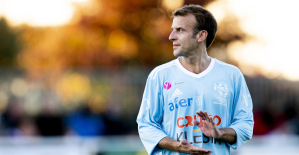 Football: Deschamps, Drogba, Desailly... Beautiful people with Emmanuel Macron to play with the Variétés
Football: Deschamps, Drogba, Desailly... Beautiful people with Emmanuel Macron to play with the Variétés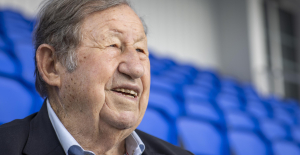 Football: “the referee was bought”, Guy Roux’s anecdote about a European Cup match… with watches and rubies
Football: “the referee was bought”, Guy Roux’s anecdote about a European Cup match… with watches and rubies


















